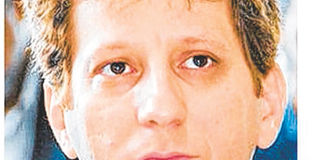Tycoon’s death sentence feeds perceptions of high-level graft

Babak Dehghanpishen
What you need to know:
Hundreds of Iranians have taken to social media to vent their frustration about the opaque nature and outcome of the judicial proceedings against the businessman, who says he was backed by powerful officials during the term of hardline former President Mahmoud Ahmadinejad.
Iran’s planned execution of billionaire Babak Zanjani (pictured) for corruption will mask the identity of senior officials who supported him, say the president and two lawmakers independently assessing a case that has fuelled public cynicism about political graft.
Hundreds of Iranians have taken to social media to vent their frustration about the opaque nature and outcome of the judicial proceedings against the businessman, who says he was backed by powerful officials during the term of hardline former President Mahmoud Ahmadinejad.
Zanjani has said he helped Iran circumvent sanctions by selling its oil abroad. He was arrested in 2013 and detained in Tehran, accused by the judiciary of pocketing more than $2.7 billion for oil sold on behalf of the Ahmadinejad government, months after moderate President Hassan Rouhani won power campaigning against corruption in government.
Zanjani, who is in prison, has denied withholding oil revenues. “As soon as the government changed I was portrayed as a thief,” he said in court, according to the Fars News agency. He plans to appeal his death sentence, which was handed down this month.
This writer was unable to contact Ahmadinejad for comment.
The case has highlighted the complexities of Iran’s system of clerical and republican rule where power is wielded by both elected and unelected officials. But much remains unclear, including any involvement of government figures in Zanjani’s financial transactions, due to the opaque nature of the Iranian political and judicial systems.
Rouhani, who says he wants to wipe out the corruption that spread during his predecessor’s tenure, has publicly criticised the handling of the case. The president has questioned who enabled Zanjani to carry out deals involving huge sums of money and whether that money can be recovered if he is executed
“Who protected him and created a space for him to do such things?” Rouhani said at a gathering during a visit to the city of Yazd last week. “What the people want is to know how and with who’s permission this individual was able to sell oil and where has all of this money gone now?”
“Execution isn’t going to solve any problem,” he added.
Rouhani has little sway among the hardliners who dominate the judiciary, which is independent of government. The president, whose power is eclipsed by that of Supreme Leader Ayatollah Ali Khamenei, has clashed with judicial authorities on several occasions since winning power, on issues ranging from public music concerts to the arrests of journalists.
He cannot revoke a death sentence, a power held only by the supreme leader and the head of the judiciary, according to Hadi Ghaemi, executive director of the International Campaign for Human Rights in Iran.
Two lawmakers on a parliamentary committee separately investigating the case to identify any wrongdoing in government and recover the oil revenue, said an execution would do little to tackle corruption.
They said it would allow officials who backed him to escape justice - though they did not identify any such figures or explicitly accuse these officials or the judiciary of trying to silence Zanjani.
“Executing the accused will allow the hands behind the scene, who were even more responsible for this case than the accused, to be forgotten,” Hussein Dehdashti, an independent lawmaker, said on March 6 after the sentence was announced, according to the Islamic Consultative Assembly News Agency.
Amir Abbas Soltani, another independent lawmaker on the committee, said: “The government officials who were corrupt and profiteering are still being protected and have not been confronted.”
“They haven’t even been questioned in court,” he said in an interview with the Iranian Labour News Agency last week. “By executing one or two people accused in this case and ignoring the main people responsible, the problem of this case and economic corruption in the country will not be solved.”
The committee was set up at the time of Zanjani’s arrest. Soltani said that the aim of the 10-strong panel was to “identify and reveal the people who were involved in the profiteering, fraud and corruption with him and protected him”, as well as to secure the return of the money.
Asked what legal authority it had, he added: “They can legally pursue this matter until they achieve a result.” He did not elaborate.
It is not clear if the committee has the power - constitutionally or in practice - to punish any officials who might have backed Zanjani’s activities.
Two other lawmakers who are not on the committee, Gholamali Jaafarzadeh Imanabadi and Mohammad Ali Esfanani, have also publicly criticised the death sentence and said it would prevent officials who supported him from being revealed - without giving any names.
Many ordinary Iranians have little affection for Zanjani, one of Iran’s richest men who amassed a fortune as they toiled to make ends meet under the hammer of sanctions. Nevertheless hundreds of Facebook, Twitter and Telegram users expressed their anger about the secrecy surrounding one of the biggest financial corruption cases in Iran’s history and the sentence handed down.
The writer filed this article from Beirut




